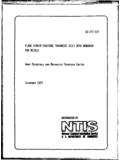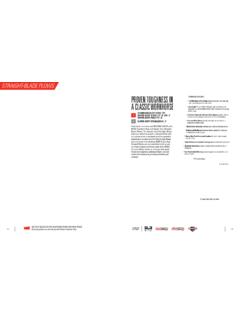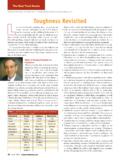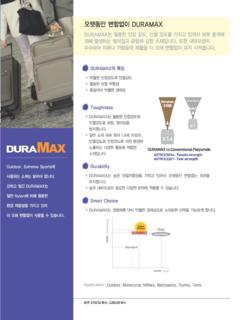Transcription of Discovering Mental Toughness: A Qualitative Study of ...
1 Discovering Mental toughness : A Qualitative Study of Mental toughness in Elite Athletes [R] Simon C. Middleton, Herb W. Marsh, Andrew J. Martin, Garry E. Richards, and Clark Perry SELF Research Centre, University of Western Sydney, Australia What is Mental toughness ? This research draws on the experience of elite athletes and coaches to unearth a conceptualisation and definition of Mental toughness . The interviews of 33 elite athletes and coaches (including 25 current or former elite athletes, of whom 15 had achieved an Olympic Gold Medal or World Champion status) were transcribed verbatim and analysed qualitatively to reveal underpinning components of Mental toughness .
2 Mental toughness is multi-dimensional and consists of twelve components, including: self-efficacy, potential, Mental self-concept, task familiarity, value, personal bests, goal commitment, perseverance, task focus, positivity, stress minimisation, and positive comparisons. Mental toughness is defined as an unshakeable perseverance and conviction towards some goal despite pressure or adversity. This conceptualisation of Mental toughness provides a platform from which instruments of measurement can be developed. She just had this ability to overcome adversity, she always and she would just find ways to push herself through whatever she needs to push I think her mother had died of cancer five or six years ago, and her brother got killed this year and she s somebody who always seems to emerge from beyond whatever she s dealing with, to get through it and surpass what anybody would think you could do.
3 She s tough, she ll go that extra yard, that extra hard yard that most people won t. What exactly does it mean to be mentally tough? The above quote from an elite sportsman in this Study is highly representative of how coaches and athletes alike can readily identify someone in terms of their Mental toughness . Yet, despite this apparent understanding, little has been done to develop the concept from a theoretical basis. Indeed, the term Mental toughness remains inadequately defined and conceptualized. Stemming from these inadequacies, measurement of Mental toughness remains illusive elusive?
4 Therefore, this paper s primary aim is to learn more about Mental toughness from expert sources elite athletes and coaches familiar with Mental toughness . The primary yield of this Study is a definition and conceptualization of Mental toughness that is based on sound research methods. This significant work will provide the platform needed to pursue measurement approaches in future work. In Search of Mental toughness Sport psychologists (researchers and practitioners), coaches, sports commentators, sports fans, and athletes acknowledge the importance of Mental toughness in sporting performance (see Goldberg, 1998; Hodge, 1994; Tunney, 1987; Williams, 1988).
5 In early work on the issue, Loehr (1982, 1986) emphasised that athletes and coaches felt that at least fifty percent of success is due to psychological factors that reflect Mental toughness . Similarly, Gould, Hodge, Perterson, and Petlichkoff (1987) emphasised that coaches feel that Mental toughness is important in achieving success, while Norris (1999) has emphasised the importance of Mental toughness in developing champion athletes. Despite widespread agreement on the importance and benefits of Mental toughness and calls to identify psychological attributes that create champions, high quality research into Mental toughness is limited.
6 In one Study of Mental toughness , Fourie and Potgieter (2001) analysed written responses from 131 expert coaches and 160 elite athletes. Their analysis identified twelve components of Mental toughness including: motivation level, coping skills, confidence maintenance, cognitive skill, discipline and goal directedness, competitiveness, possession of prerequisite physical and Mental requirements, team unity, preparation skills, psychological hardiness, and ethics. In contrast to Jones et al. (2002), the researchers suggested that further work was needed to finalise a working definition of Mental toughness .
7 Most recently, Jones, Hanton and Connaughton (2002) conducted a Qualitative Study of elite athletes, aiming to define Mental toughness and to determine the essential attributes required to be a mentally tough performer. The definition that emerged from their analysis concluded that: Mental toughness is having the natural or developed psychological edge that enables you to: 1) Generally, cope better than your opponents with the many demands (competition, training, lifestyle) that sport places on a performer; and, 2) Specifically, be more consistent and better than your opponents in remaining determined, focused, confident, and in control under pressure.
8 (p. 209) They also identified twelve attributes of Mental toughness . These attributes include self-belief, an unshakeable focus, high levels of desire and determination (especially at times of distress), and overall consistency of effort and technique despite life and sport stresses. The strength of their research is that multiple components of Mental toughness are identified thus reinforcing the notion that Mental toughness is multidimensional. Unfortunately, the definition presented remains inadequate in that it describes what Mental toughness allows one to do, rather than defining Mental toughness itself.
9 Furthermore, little attempt was made to establish or draw upon any theoretical background in the understanding of these Mental toughness attributes. When Qualitative data are presented in this way, what results is simply a description of what participants said, without any attempt to integrate established theory. Probably the most significant weakness in the area of Mental toughness research is the dearth of information establishing any kind of theoretical background. For this reason, the current Study draws knowledge significantly from the participant, but is guided by established theory. This approach signifies the birth of Mental toughness theory.
10 Despite significant recent attempts, the concept of Mental toughness remains inadequately defined and conceptualised. This Study attempts to progress the area by intertwining sound Qualitative practice with guidance from relevant established theory, in the development of Mental toughness definition and conceptualisation. Indeed, the overarching aim is to develop an understanding of Mental toughness that is based on experience tied with theory, providing an excellent platform to explore measurement and training. Statement of the Aims The broad aims of this investigation were to draw upon both Qualitative data and established theory to develop a theoretical understanding of Mental toughness .







